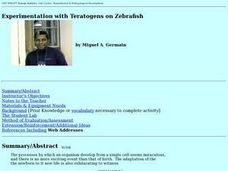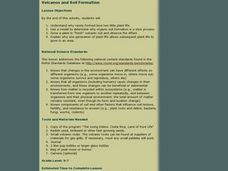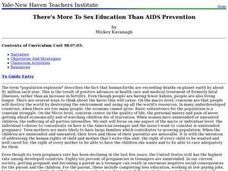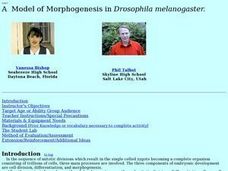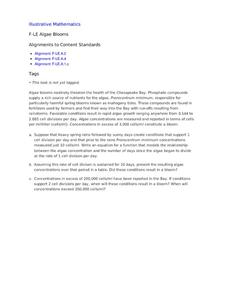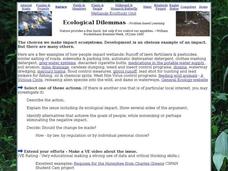Curated OER
Experimentation with Teratogens on Zebrafish
Students compare mitosis and meiosis with regard to chromosome number in parent cells versus daughter cells, types of cells produced, total number of cells produced, and the number of divisions. In groups, identify and differentiate the...
Curated OER
What's Organic?
Students define and discuss terms organic and synthetic, read article pertaining to organic agricultural practices in Oklahoma, complete worksheet, grow plants using both commercial and organic fertilizer, compare growth rates, and chart...
Curated OER
Embryological Development Using Medaka Fish
Students analyze and record major events that occur in the development of Medaka fish eggs from fertilization to hatching. In small group, students describe the processes involved, creating a timeline of the major events in the...
Curated OER
Why So Many Frogs?
Students explain the different stages in the growth of a frog, then analyze and collect data to make generalizations about a larger population. They determine the survival rate of a population of tadpoles under controlled conditions.
Curated OER
Are Seeds in Danger?
Eighth graders discuss uses and disposal of common household chemicals. They select a household chemical to test for impact on plant germination. Students decide how they want to set up a seed germination project. They design their plan,...
Curated OER
There's More To Sex Education Than AIDS Prevention
Pupils are introduced to the views on sexuality in the United States. In groups, they research data from five countries and compare them with the United States. Using the information, they develop reasons why the teenage pregnancy rate...
Curated OER
Growing Corn
Sixth graders create a Venn diagram of different soil types. They plant cord seeds in clay, sand, and fertile black soils are record their growing rates. After two weeks they discuss the effects of soil types on the growth process.
Curated OER
What's The Flow?
Students examine urban runoff and identify peak flows. They examine causes for different flow rates, and complete worksheets and a graph.
Curated OER
A Model of Morphogenesis in Drosophila Melanogaster
Learners investigate the following scientific terms and ideas: rates of diffusion, the role of morphogens in the development of larva, the chemical dynamics of a cell, and the significance of embryo polarity during development.
Population Connection
Where Do We Grow from Here?
Did you know that the population is expected to grow to 11 billion by 2100? The resource serves final installment in a six-part series on the global population and its effects. Scholars interpret data from the United Nations about the...
Curated OER
Pesticide Watch Card
Young scholars examine human health by identifying dangerous pesticides. In this agriculture lesson, students research the food production system in the United States and discuss dangers such as pesticides, chemicals and insecticides...
Curated OER
Sustainable Livestock
Students investigate healthy eating habits by researching livestock. In this food sustainability instructional activity, students research the negative impact factory farming has on our environment due to pollution. Students define...
What happened to the frogs?
Students will select ten rubber frogs and determine their pollutant source based on their malformations. Students will write a brief essay on their findings. Students will be engaged in the lesson the entire time!
Curated OER
Generating Hypotheses & Experimental Design 2
An outline walks your scientists through the steps of the scientific process. It begins by taking a general idea and developing a hypothesis based on related factors. Each investigator then plans a method for testing the hypothesis,...
Curated OER
Algae Blooms
Your microbiologists explore a changing algae population and build an exponential function modeling algae concentration from the description given of the relationship between concentrations in cells/ml and days of rapid growth.
K12 Reader
Summarize It: President Theodore Roosevelt's 7th Annual Message to Congress
How did Theodore Roosevelt stress the importance of conservation during his time as president of the United States? Take a closer look at the language Roosevelt used himself in a 1907 address to Congress, and have your young historians...
Curated OER
Anguilla: An Island Economy
Students role play a potential investor and prepare a position paper concerning possible investment opportunities in the Caribbean--specifically, the island of Anguilla. They read a variety of articles as they complete research needed to...
Curated OER
Pop Quiz
In this geography skills practice worksheet, students respond to 12 multiple choice questions about world population statistics.
Curated OER
We've Come a Long Way, Baby!
Students study technology and the different reproductive technologies available today. In this human reproductive technology instructional activity students describe how engineers create technologies to improve the health of mothers and...
Curated OER
Watershed Protection
Learners explore environmental care by participating in an Earth science activity. In this clean water lesson, students discuss what a watershed is, how they become polluted, and how it affects the overall quality of drinking water....
California Academy of Science
Where Do I Put My Trash?
Where does the trash go after you put it in the garbage can? The class discusses sustainability, recycling, compost, and landfills as they play as fun relay game. In teams, they race to be the fastest group to successfully sort their...
Curated OER
Changes in Ecosystems
In this changes in ecosystems worksheet, learners complete 21 various types of questions related to ecosystem. First, they determine whether each statement is true or false based on vocabulary. Then, students determine whether natural...
Curated OER
Eutrophication Experiments
Observe two different water samples and write down observations. Write a paragraph which predicts the relative amounts of nutrients, nitrates, and phosphates in the water samples. Compare water samples under a microscope.
Curated OER
Ecological Dilemmas in Wetlands
For this ecological dilemmas in wetlands worksheet, learners select a topic, use the links to websites for research, describe the topic, explain its impact on wetlands, identify alternatives and decide on possible changes. An...


